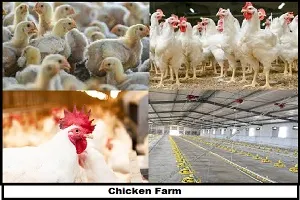Chicken is one of the animals that has played a significant role in human life since prehistoric times. As a rich and versatile source of protein, chicken has become an integral part of many cultures and cuisines around the world. From modern farming practices to traditional recipes, the role of chicken in providing nutrition and culinary enjoyment is undeniable. This article will explore various aspects of chicken, from its history to its impact on everyday life.
History and Evolution
Chickens originated from a species of wild bird called Junglefowl, which originated in Southeast Asia. Humans first began domesticating chickens around 8,000 years ago in South Asia, and from there, chickens spread worldwide through trade and migration. Various cultures began to appreciate chickens for their meat and eggs as well as in religious contexts and ceremonial practices.
Role in Agriculture
In many countries, chickens are not only considered a source of food but also as economic and agricultural assets. Chicken farming has rapidly expanded in many parts of the world, with broiler and layer chickens becoming major commodities in modern agriculture. Additionally, chickens provide additional benefits through the nutrient-rich fertilizer from their droppings for crops.
Culinary and Cuisine
Chicken plays a central role in various cuisines around the world. From classic roast chicken recipes to flavorful chicken curries rich in spices, the culinary variations of chicken are diverse and abundant. Various parts of the chicken are also utilized in cooking, from the tender breast meat to the feet and heads used in soups or broths. With its versatile texture and ability to absorb flavors well, chicken is a primary ingredient in creative culinary creations across cultures.
Health and Nutrition
Chicken meat is a rich source of animal protein and relatively low in fat, making it a popular choice for many people following a healthy diet. Additionally, chicken also contains various important nutrients such as B vitamins, iron, and selenium. However, it is important to pay attention to how chicken is processed and cooked, as the addition of excess fats or certain cooking methods can alter the nutritional value of chicken dishes.
Sustainability and Ethics
The chicken farming industry has been the subject of debate regarding sustainability and animal welfare. Unethical farming practices, such as overcrowded cages or excessive use of antibiotics, have raised concerns among the public. To ensure sustainability and animal welfare, many farms are transitioning to organic practices, free-range enclosures, and healthier feed.
Complete Guide to Chicken Farming
Chicken farming is a popular and economically beneficial activity for many people worldwide. With the right understanding of care, nutrition, and farm management, anyone can start a successful chicken farming venture. Here is a step-by-step guide to starting chicken farming:
1. Preparation and Planning
- Determine your chicken farming goals, whether for meat, eggs, or both.
- Choose the type of chicken suitable for your goals, such as broiler chickens for meat or layer chickens for eggs.
- Decide on the scale of the operation, whether for personal consumption or commercial purposes.
2. Coop Construction
- Build or prepare a coop suitable for the number of chickens and the chosen farming type.
- Ensure the coop has proper ventilation, security from predators, and easy-to-clean facilities.
- Provide comfortable nesting areas for laying hens if your goal is egg production.
3. Chicken Selection
- Obtain chickens from reputable breeders or purchase from trusted livestock markets.
- Ensure chickens are healthy and free from diseases or infections.
- Select chickens suitable for your living environment and farming needs.
4. Feeding and Watering
- Provide balanced and high-quality feed according to your chickens' nutritional needs.
- Ensure chickens have adequate access to clean and fresh water at all times.
- Monitor chickens' food and water intake regularly to ensure their health and productivity.
5. Health Care
- Regularly check your chickens' health and respond promptly to signs of illness or abnormalities.
- Vaccinate chickens according to breeders' or veterinarians' recommendations.
- Protect chickens from parasites and diseases by maintaining good coop hygiene and sanitation.
6. Production Management
- Record your chickens' production data, including egg production, body weight, and chicken growth.
- Establish an efficient management plan to maximize the productivity and profitability of your chicken farming.
Continuously learn and apply best practices in chicken farming to improve yields and chicken welfare.
By following this guide and being consistent in care and management, you can start and run a successful chicken farming venture. Remember to always prioritize the health and welfare of your chickens for long-term success in chicken farming.
Conclusion
Chicken is not only a vital source of food for humans but also plays a significant role in culture, economy, and the environment. From farm to table, the presence of chicken at every step of the food process demonstrates how important this animal is in our lives. Through efforts to improve sustainable farming practices and cook wisely, we can continue to enjoy the benefits of chicken without sacrificing animal welfare or the environment.
That is the article Complete Guide To Starting A Chicken Farming Business. If there are any deficiencies or errors in writing this article, Baraja Farm express their deepest apologies. Please leave a wise message in the comments column provided. Thank you for visiting, hopefully it's useful.
Other reading materials, can help with school assignments, click Pustaka Pengetahuan
To increase insight and knowledge, please click Berbagai Reviews
For tutorial on how to cultivate, please click Baraja Farm Channel
Social media please click facebook







0 Komentar